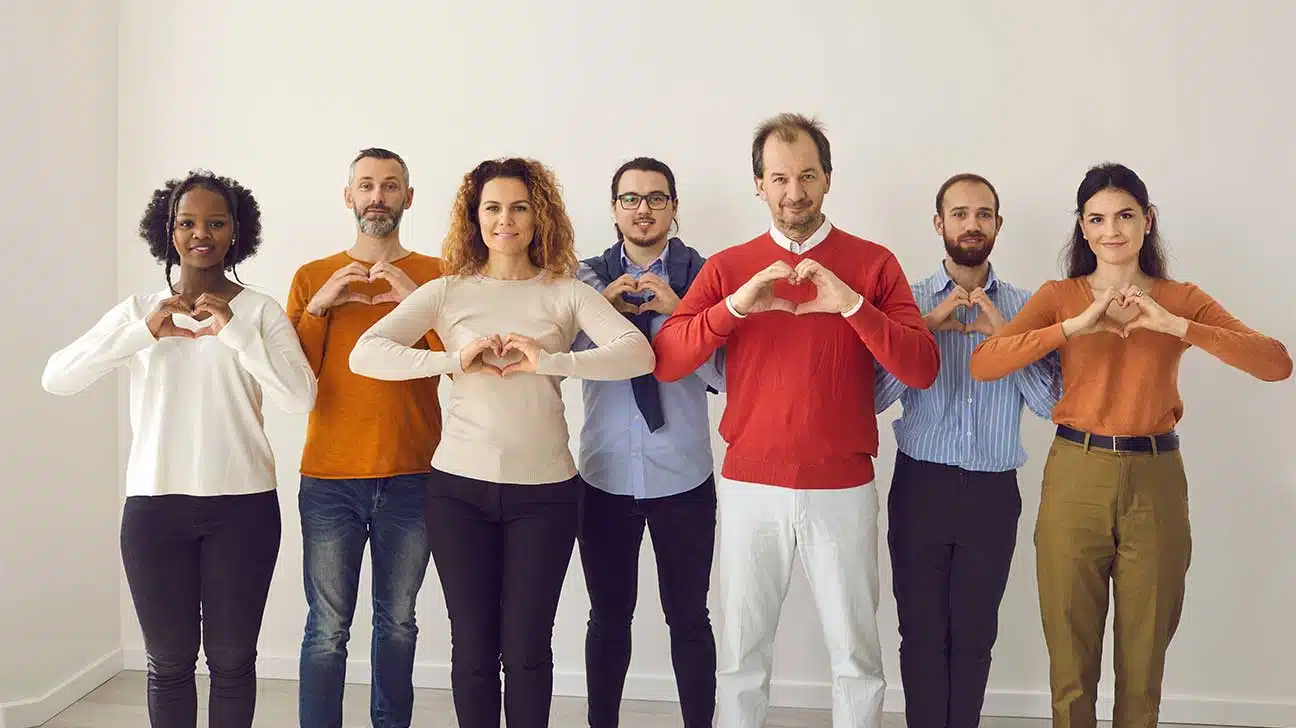
The 12 promises, also known as the AA 9th Step Promises, are the outcomes and results of successfully working through the Alcoholics Anonymous program.
These promises are what a person should do to achieve a healthier outlook and achieve sobriety. They also increase the chance of lasting recovery by highlighting what you gain by walking this path.
For people on the road to recovery, programs such as AA, Narcotics Anonymous (NA), or other 12-step recovery programs can be a beacon of light.
According to the AA program, recovery is accomplished by working through the 12 steps, following the 12 traditions, and adhering to the 12 promises in “the big book” of AA.
We will delve into each of these promises to showcase their purpose and how they help people gain clarity, humility, and balance in their lives.
Promise 1: “We Are Going To Know A New Freedom And A New Happiness.”
The first promise lets people in recovery know that AA meetings and the AA support system will allow them freedom from addiction. The promise states that their life will be theirs again.
Regaining autonomy over your life means you become empowered. Empowerment can lead to growth and hope for the future.
Addiction can be life-consuming and recovery can be a long journey. The cycle of addiction can cause you to feel helpless and trapped. Promise 1 challenges these feelings, replacing them with hopefulness and belief in another way forward.
Promise 2: “We Will Not Regret The Past Nor Wish To Shut The Door On It.”
The fourth step of the 12-step method asks you to make a searching and fearless moral inventory of the self. Similarly, promise 2 involves looking over past mistakes and making amends.
Past mistakes may be embarrassing to recall. You might feel defined by the mistakes you’ve made. But mistakes are a key piece of learning, growing, and building self-awareness.
Mistakes can also help teach us about what we value. Step by step, we can work towards focusing on those values instead of on destructive behaviors and the addictive cycle.
Embracing mistakes allows for growth and change. Avoiding or denying mistakes only inhibits potential growth.
Promise 3: “We Will Comprehend The Word Serenity.”
People struggling with substance abuse sometimes feel engulfed in inner and outer chaos. They are constantly struggling to find a feeling of balance and calm.
At its core, the word serenity represents peace of mind and well-being. Having this as a focus can help you avoid the behaviors that bring about chaos and destruction.
Substance use changes the makeup of the brain, taking it out of the equilibrium that it’s naturally used to. When the brain becomes dependent on a substance, it needs that substance to continue functioning.
This addiction cycle causes the opposite of peace and serenity. Promise 3 reminds us that it’s possible to manage a substance use disorder with healthy choices and proper treatment.
Promise 4: “We Will Know Peace.”
The fourth promise introduces the concept of peace and recognizes that it is attainable.
Once you’ve decided what peace means for you, you can take the steps to obtain it. You might focus on healing relationships, embrace a new future, or reach out for support.
Promise 5: “No Matter How Far Down The Scale We Have Gone, We Will See How Our Experience Can Benefit Others.”
The fifth promise acknowledges the importance of supporting others throughout the healing process.
An invaluable resource during recovery is peer support. Peer support is rooted in the shared experience. Others understand because they’ve been there, too.
Even when someone is at their worst, those moments of struggle do not have to define their identity. Tomorrow is another day.
Once you’re able to heal and embrace the fullness of life, those difficult experiences may be helpful in helping someone else heal.
Promise 6: “That Feeling Of Uselessness And Self-Pity Will Disappear.”
Promise 6 is centered on accepting mistakes and learning from past experiences, both of which can help mitigate feelings of self-pity.
Being a member of the recovery community, and other communities at large, can also help people in recovery feel needed and valued.
Remember that your past experiences can help heal others — and that you can be a light for others in recovery.
Promise 7: “We Will Lose Interest In Selfish Things And Gain Interest In Our Fellows.”
When people see themselves as worthy and useful in the community, they begin to let go of selfish thoughts and actions.
By understanding that you are worthy of love and acceptance, you can begin to believe in your capacity for mistakes and growth without judgment. There is less of a focus on the pain within.
By being focused on healing and understanding, and by meeting your needs in healthier ways, you become less focused on destructive, selfish behaviors.
Your need to focus on the self and your problems no longer serves you. You suddenly have a greater capacity for compassion and develop an interest in others.
Promise 8: “Self-Seeking Will Slip Away.”
Once you develop emotional intelligence, healthy coping skills, and awareness of insecurities, you’ll be able to spend your energy elsewhere.
No longer preoccupied by the pain within, you’ll be able to improve your relationships with others. When we focus on meeting our needs in healthy ways, we’re better able to show up for those around us.
Once your own needs are met by your capacity for growth, your values, and your goals, you’ll have less of a desire or need to be focused on yourself.
You’ll be able to make space for others and yourself in a way that is mutually beneficial.
Promise 9: “Our Whole Attitude And Outlook Upon Life Will Change.”
The more you focus on growth and notice the positive influence that you’re having on the world, the more you’ll begin to see why these are promises and not just wishes.
Just as therapy involves treatment to help people reach healthy goals, these promises work in a similar way. They help people attain better health, mentally, physically, and spiritually. This, in turn, brings about a new way of life.
When you’re aware of the benefits that you and others bring to the world, even in challenging times, your life will change.
Promise 10: “Fear Of People And Of Economic Insecurity Will Leave Us.”
The more positive interactions you have with people, the more you’ll learn who you can trust and feel safe with.
Without addiction getting in the way of financial independence and security, you’ll open doors to greater opportunities and the ability for stability.
Promise 11: “We Will Intuitively Know How To Handle Situations Which Used To Baffle Us.”
The more support people receive from others, such as their peers and treatment team, the more they learn how to manage situations they may not have known how to cope with before.
By understanding coping strategies, like how to set healthy boundaries and look out for their own well-being, people can handle what comes their way.
Promise 12: “We Will Suddenly Realize That The Program/God Is Doing For Us What We Could Not Do For Ourselves.”
As AA members work through the 12 steps, they discover the benefits of healing. They realize that adherence to the program has led to well-being and personal growth.
Promise 12, For The Secular And Believer
People of faith might recognize that promise 12 involves surrendering and giving shortcomings over to god.
In this promise, you look back over how far you’ve come, and acknowledge that you couldn’t do it alone. With the help of the program and a higher power, you have found a new life.
This only works if you’ve come to terms with the fact that you need help. You must be open to change and to surrendering old belief structures and patterns.
For those of a secular mind, “god” may be replaced with the word “program.” While you might set the goals to heal yourself, you still need guidance from a power greater than yourself to succeed.
By following what you define as a power greater than yourself and by accepting the help of your support networks, you will experience change. This can only happen with the assistance of others.
How Can 12-Step Programs Help?
The 12-step method helps people gain insight through the assistance and support of others. By witnessing the benefits of the program, people become aware of their own capacity for healing.
Following the 12 promises of AA along with the 12 steps can help people realize their full potential. People can achieve a state of balance that they may not have been able to obtain without help.
Along with getting addiction treatment, working through the 12 steps and seeing the promises of AA unfold can be beneficial for many.
Find Addiction Treatment Today
Setting out on the healing journey can truly transform your life. For more information, reach out to us today and start the road to recovery.
Published on January 16, 2024
Addiction Resource aims to provide only the most current, accurate information in regards to addiction and addiction treatment, which means we only reference the most credible sources available.
These include peer-reviewed journals, government entities and academic institutions, and leaders in addiction healthcare and advocacy. Learn more about how we safeguard our content by viewing our editorial policy.
- 12Step.org — The 12 Step Promises
https://12step.org/references/commonly-used/the-promises/ - Substance Abuse And Mental Health Services Administration (SAMHSA) — Find Treatment
https://findtreatment.samhsa.gov/

